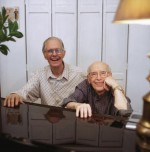Column Name
Title
John Mace (B.M. ’51, voice) and Richard Adrian Dorr (’50, voice) met cute at Juilliard 65 years ago and have basically been together ever since—but they still considered themselves unlikely poster boys for gay marriage. “I’m 91, so it’s a little passé to think of marriage,” Mace said last summer shortly after the two had agreed to appear in a public relations campaign promoting same-sex marriage—and shortly before New York became the sixth state in the country to allow it. Still, when the Legislature passed the bill last June, “we sat there on the sofa and hugged each other and said, ‘My God, I never thought it would happen,’” Dorr, 84, recalled last month.
Body
The pair, who are still active voice teachers, were students when they met, in 1948. Mace was in his second year at the School and was working in the Extension Division, helping out with scheduling. “I was in a snit because I was told I had to go to the office,” Dorr said. But when he got there, he and Mace saw each other. “That was the pitter-patter. We’ve been going around ever since.”
Being gay in the 1940s was generally not accepted, and Mace said that the two had always been very guarded. Nevertheless they’ve carved out a wonderful life. Mace has taught voice since graduating from Juilliard; Dorr struck a balance between teaching and performing. (“He’s 6 feet 4 inches—leading man material,” the significantly shorter Mace said. “I could have only gotten character work.”) Their roster of pupils reads like a who’s who of the performing arts and includes multiple members of the Redgrave family, Marsha Mason, Bette Midler, Tammy Grimes, and Morgan Freeman among many others.
Born in Providence, R.I., Mace grew up singing, eventually taking lessons for 25 cents apiece at a Works Progress Administration-sponsored music school. When World War II started, Mace joined the Army and, rather ironically, said he’d “never felt more liberated—I loved it! I’d always been very protected; my brothers [Mace was the sixth of seven children] were very athletic but I wasn’t, and I wasn’t even allowed to ride a bike.”
Mace learned that he’d been accepted at Juilliard during a quiet moment in the monthlong Battle of the Bulge. In a more heated moment, he crawled over to ask the radio operator to radio for more artillery fire (successfully), and he was eventually awarded a bronze star. The war ended a few months later, and when Mace returned to the U.S., he made his way to New York City—and never left.
“At Juilliard, I studied everything, and I was able to buy all the music through the G.I. Bill; I still have a wonderful library of music,” Mace said. Among his teachers were Robert Hufstadter and his wife, Alice Anderson; James Hardesty, and Beverley Peck Johnson. “I was very fortunate to have them.”
Dorr had been adopted when he was 2, and his adoptive mother later said that he cried for the first few days after leaving the orphanage—and then he started singing and never stopped. Until he was about 40, his name was Richard Prahl, “but I hated that name—it means braggart in German,” he said, so he changed it to Richard Adrian Dorr.
After high school, Dorr matriculated at Holy Cross College, where he was pre-med, and when he was 18, he enlisted in the Navy and served in the medical corps. After the war, Dorr worked as a radio announcer for a year in Fitchburg, Mass., near his hometown, and then enrolled at Juilliard, in 1948. Other than meeting Mace, his favorite Juilliard experiences are “Sergius Kagan teaching German lieder and Msr. Vaillant doing the French coaching,” Dorr said. “I was fortunate that I had a very good imitative ear, so I got high marks in delineation and diction of French and German.” He also recalls that singer Leontyne Price (’52, voice) was one of their classmates: “She was a kick in the head.”
The pair aren’t teaching quite as much as they used to—Dorr now has seven or eight pupils, Mace about a dozen. “You do slow down,” Mace said, although he seems remarkably spry. Mace does a lot of therapeutic vocal work these days; “people with nodes,” he said. “It’s a little boring, but I like it.” He feels that the vocal style in Broadway musicals started going downhill with Hair—but came back with The Book of Mormon. He thinks Beyoncé has a lovely voice even though it’s screechy on the top notes—“but people love that.”
Keeping up with the scene and teaching don’t leave them a lot of spare time, but one thing the couple definitely plans to do soon, Dorr said, “is going downtown and getting our [marriage] license.”





